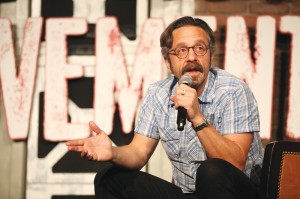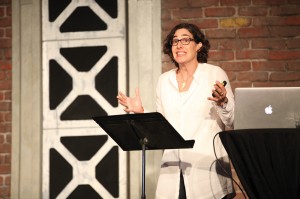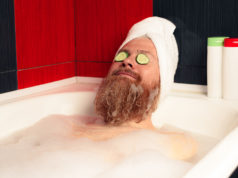Standing at a coffee table, drained from asking countless strangers about their podcasts and backgrounds, I half-heartedly asked Elizabeth Craft if she had a podcast, less than confident her unassuming nature would produce a story that could compete with what I’d already heard. She told me she hosted one with her sister about how to be happy. She called her sister over, who turned out to be New York Times bestselling author Gretchen Rubin. The Happier podcast operates on Panoply, Slate’s podcast channel and a platform that nearly every attendee at the conference would kill for.
Craft was a recurring character in Rubin’s books, so it made sense for Rubin to bring her real-life sister’s personality to the podcast. Rubin’s books, Craft said, “are very personal but in a very different way” from the podcasts.
Neither was speaking at the conference, but while enjoying the growing success of Happier, they wanted to learn ways to sustain and maximize that success. Even popular podcasters were learning on the fly and sharing their experiences though presentations like “What Michael Jackson Can Teach You about Podcasting” and “Using Statistics to Learn about Your Listeners and Grow Your Podcast.”
“I bet in the next five years, [Podcast Movement] is going to be huge,” Rubin predicted.
Rubin also sees similarities between podcasting and a phenomenon that erupted over a decade ago and permanently changed the media landscape. “This is very much like blogger culture,” she told me. “Because I started out in blogger culture. Very much the same thing. Gigantic growth every year. From the little garage to the behemoth, everyone’s obsessed with monetization and discoverability. It’s very interesting to see it happening again.”
To hear Rubin describe it, podcasts are like the new American startup. And, yes, there are plenty of podcasts about how to run a successful startup.
******
Inherent in the growth of podcasting is a certain kind of paradox. You might say the medium is growing horizontally more rapidly than it is vertically. Take a prime time television show on ABC, for example. Typically, its intended audience is, well, everybody. In the podcasting world, however, niche programming has found its most logical home. The audience is big and only getting bigger, but everyone is finding their own thing.
“I think it goes all the way back to middle school and finding your group, finding that table at the lunchroom with people you immediately relate to and connect with,” said Heather Wilder, a creative care specialist at Patreon, a crowdfunding company, who led a Sunday panel called “Quit Your Day Job: Sustainable Crowdfunding for Your Podcast.”
So do you want to stand in front of the lunchroom and have broad conversations with the whole school, or do you want to have intimate discussions with the people at your table? The guys behind the Funkytown Podcast have found their lane “covering the goings-on in [the Near Southside] with an emphasis on the music.” There is obviously a cap on the number of people in their target audience. It’s an interesting question going forward in the next five to 10 years: With the numbers of people downloading podcasts on the rise, will advertisers slowly force programs to appeal to broader audiences in attempts to legitimize the platform, or will the medium continue to thrive through variety and specificity?
*****
If the Podcast Movement in Fort Worth reflected the wide-ranging diversity of podcasting in general, nothing exemplified this more than conservative political commentator Glenn Beck. After backing out as a keynote speaker, he was replaced by WTF’s Maron, comedian and former host on the now-defunct liberal talk radio network Air America. Maron is one of the few exceptions to the notion that one podcast cannot reach enormous audiences –– his interview with President Obama in late June has been downloaded more than 2 million times — and he’s the reason I found out about Podcast Movement.

I’ve known about WTF for a few years and had even heard some of his interviews with comedians, actors, writers, and musicians. I’ve known people who are obsessed with his podcast to an almost religious degree and connect with it on a deep and personal level. I never thought I’d be one of them. But somewhere along the way, I became hooked. Now, I get anxious if I don’t listen to a new episode the day it comes out. And I’m not alone. I’m one of hundreds of thousands who are more than just casual listeners. It’s something about how he gets the most out of his guests. Something about the way he speaks about life in a cynical, well-articulated manner that makes you laugh despite your best instincts. Something about his vulnerability and complete honesty about his insecurities — when asked during his presentation if he imagined back when he started WTF that it would become this successful, he responded, “I didn’t imagine anything. It was the alternative to suicide.”
So it was when I pressed play and heard Maron mention that he would be in Fort Worth for something called “Podcast Movement” that my interest was piqued. Podcasts had crept into my life and weren’t going anywhere. They’re a way for me to curate my downtime in the most productive manner possible. There isn’t always a friend for all your interests, willing to discuss them with you in any sort of depth, but there’s probably a podcast for each and every one. You can laugh. You can learn. You can be entertained in a way that rivals television or film.
It’s still new, though. No one is credited with inventing it. No one quite knows how to monetize it. There doesn’t seem to be much rhyme or reason to how to be good at it. People are trying to figure it out, and, really, that’s what Podcast Movement seemed to be more than anything: a bunch of people talking about how to talk about stuff.
******
When I asked Maron if he thought the event was a sign of the growing success of podcasting, his response was cautious, with a touch of cynicism. “Anytime that something exciting happens that a community can be built around, somebody’s going to figure out how to have a conference.”
One of those somebodies is Dan Franks, a CPA at a small firm in Dallas. All weekend you could see him, in a shirt and dark blazer, speed-walking around the hotel, making sure everything was running as planned.
Franks is the co-organizer of Podcast Movement. It was only a few years ago that he and fellow organizer Jared Easley realized there wasn’t a conference for podcasters. The two listeners put together a Kickstarter campaign that tripled its intended goal.
One year and numerous sponsors later, it’s a second full-time job for Franks, requiring nearly 40 hours a week of commitment. “We were a little naïve to what it actually took to do it,” Franks told me. “That’s the most honest answer. … This thing turned into something much larger than we expected.”
What sparked this obsession of podcasts in Franks that led to Podcast Movement? At the core, it was monotony. People listen to podcasts to pass the time while they exercise, do household chores, commute to jobs, or even survive the workday. Coming out of college into the world of accounting, Franks was exposed to the “amount of time sitting in front of a desk, punching away at numbers. It really was about finding something to pass the time.”
I mention the last-minute addition of Maron as the WTF host walks past us, alone, seemingly dazed from countless selfies, and Franks loses track of the question. “I got those chills as you said that, and [Maron] walks by. He’s just hanging out and talking to people, and it’s awesome. This community is so great to have someone like [Maron], who literally a month ago was talking to the president in his garage, and now he’s hanging out in the conference.”
******
“Let’s get some water,” Danny Peña said to me. “You want some water?”
Peña was coming straight out of an interview with Rob Greenlee for the Spreaker podcast. He’s done a lot of talking this weekend, even for a podcaster.
“You were here Friday night? So you saw me getting all emotional?,” Peña asked with an embarrassed smile after a sip of water.
Peña started an internet radio show in 2001 and turned it into a podcast in 2005. People told him that a hip-hop/video game podcast was too niche. Fourteen years in the business would probably suggest he doesn’t require validation, but GamerTag Radio’s honor on Friday definitely felt good. “Who ever would have thought that a gaming podcast would be in the Hall of Fame?”
Peña’s past career was as a Miami hip-hop promoter in the ’90s. He worked with major record labels like Def Jam and artists like Wyclef Jean. Prior to streaming music, grassroots promotions were largely responsible for the rise of hip-hop. When Peña made the switch to podcasting, he took the same approach. When a new video game came out, he would go to stores. “I’d interview the people in line and get them excited, pass out fliers,” he said. “Out of 100 people, I might get 10 to listen to the show.”
Peña argued that same strategy still works, focusing on “grassroots, organic promotion instead of depending on the front page of iTunes.”
The only real threat Peña sees to the medium is copycats. He’s afraid of podcasters following trends and diluting the market for listeners. He compares it to a trend in hip-hop when the genre broke into the mainstream in the early ’80s after “Rapper’s Delight.” Sugar Hill Gang’s song was a massive hit, and record labels and similar groups tried to mimic it. It made hip-hop boring, Peña said, and it took artists like Run-D.M.C., LL Cool J, and the Beastie Boys to break up the repetitiveness of the scene: “When we have too many people doing the same thing, copying each other, I think it hurts the space.”
******

The final keynote of the event was Sarah Koenig’s well-produced story-behind-the-story presentation about Serial that would have met the standards of Ira Glass and This American Life. It could easily be packaged and sold as a DVD extra, complete with behind-the-scenes notes, unaired recordings, and revelations about her own doubts and guilty feelings during the process of investigation.
Serial is a cinematic investigation into a 1999 Baltimore murder case in which a 17-year old was sentenced to life in prison for killing his ex-girlfriend, despite questionable evidence. Serial, having been downloaded 94 million times since last October, represents the potential reach of podcasting as not only a public forum but also perhaps a new medium for storytelling.
Koenig recorded Serial in her basement. She had to hit the pause button whenever someone upstairs flushed a toilet. In the same vein, President Obama went to Marc Maron’s garage to record a podcast. As Koenig finished fielding questions and the lights turned on, the attendees funneled out and began the return trip to their own basements and garages, filled with confidence that you’ll be hearing their voices soon enough.












Considering how many and the various levels of podcasters in attendance who talk about all sorts of topics, you have done a very good job of summarizing a fantastic weekend for the medium.
Ft. Worth, Texas was a fantastic host city for this event and I, along with many others are looking forward to Podcast Movement 2016!
What a great write up. I was at the event and am so excited about this event and podcasting. Podcasters are combined with people with all different backgrounds and stories, but it’s an industry full of incredible people coming together to protect the ultimate goal together. Growing and sharing the industry. podcast yourself.
a great story
Good article, except it didn’t mention that no one with a local podcast show gave a rats tooter about the event. This did nothing for FTW’S Podcasts. It was very evident that the event was for someone to make money, not our city’s podcast movement. And every local podcast show that has an ounce of real talent in this town said the same thing about the event.”Hunh?”
Trolls come out of the woodwork even for a great story like this! Nice article Jonny!
Haters come out of the woodwork even for a great story like this! Nice article Jonny!
Send us the names or links of local podcasters. I’m interested in supporting the local guys.